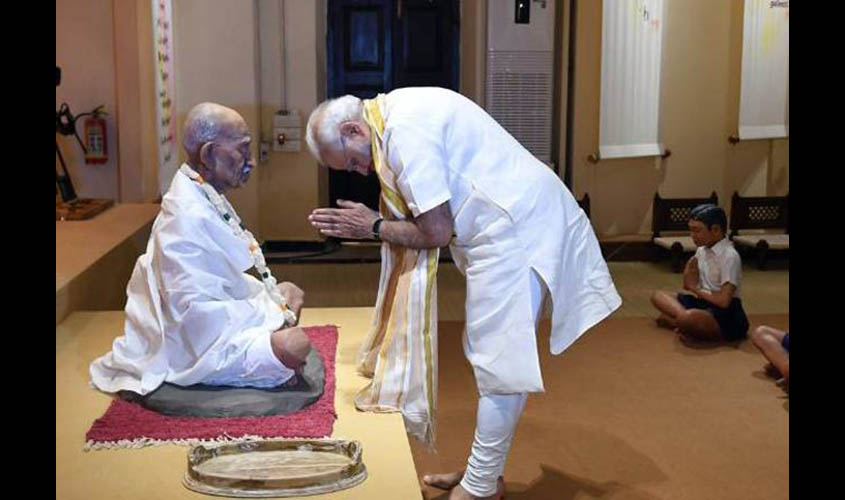The 150th birth anniversary celebrations of Mahatma Gandhi brought to fore the political skills of Prime Minister Narendra Modi, who without little difficulty appropriated for his party the legacy of the Father of the Nation. The Congress, which had the advantage of being associated with him during the freedom struggle, feebly attempted to prevent the BJP from doing so, thus ending up misplacing the political battle.
The supreme irony being that it was the BJP’s ideological parent, the Rashtriya Swayamsevak Sangh, which over the years, had perpetually opposed Gandhi’s methods and doctrine. However, the Mahatma, universally acknowledged as an apostle of peace, received an unqualified endorsement from the Sangh Parivar, with the government making sure that the mega-event was not overshadowed by past beliefs. Modi has mastered the political craft in an unparalleled manner and therefore was able to make sure that the Swachh Bharat Abhiyan and some other initiatives which were dear to Gandhi were accorded top priority.
In sharp contrast, barring some nondescript programmes launched by Sonia Gandhi, Priyanka and Rahul, the Congress, by and large, observed the event in a low key manner. When Sonia stated that the Congress alone could be viewed as the inheritor of his legacy, many in the political class contested her claim. In fact, the present Congress does not bear any resemblance with the Congress with which the Mahatma shared a deep and indelible bond. As a consequence, the Congress is imploding and has no ideological glue to retain it as a cohesive unit, given that its priorities had undergone a sweeping change when the UPA was in power for a decade long period from 2004 to 2014.
The Congress, for most people, is a family-driven organisation, which has scant respect for its glorious past, thus having allowed the BJP to hijack not only its agenda but also the legacies of many of its senior leaders. Sardar Patel, for instance, is a more visible face on the BJP posters as opposed to those of the Congress with which he had a long standing relationship. So far as the grand old party goes, Lal Bahadur Shastri too is a forgotten hero and his principles were obliterated long ago. As a matter of fact, the current Congress does not adhere to the basic rules laid down by Pandit Jawaharlal Nehru and Indira Gandhi but has framed its own set of ideas, which are far removed from the political beliefs of two of its most popular Prime Ministers.
Paradoxically, on the other hand, the BJP virtually had no meeting ground with the Mahatma. Many of its top leaders, since the Jana Sangh days, despised him, and there was a perception, right or wrong, that the Father of the Nation was assassinated not by an individual, but by a certain kind of doctrine which had similarities with the ideological DNA of the Sangh. One undisputed fact was that Gandhi was a proud Hindu and regularly chanted and listened to bhajans. However, it is well-documented that he was never a communalist and adhered to ahimsa, the philosophy of non-violence.
Even today there are elements in the BJP who detest him and continue to glorify his assassin, the late Nathuram Godse. There are also others, who perhaps were a part of the larger conspiracy to eliminate Gandhi, yet find themselves absolved of the charge due to lack of substantial proof. There were erstwhile royals, who were believed to have assisted Godse and his associates to procure the weapon which was used to kill the Mahatma. Over the years, their families have thrived in politics forging strong ties with both the Congress and the BJP.
Gandhi was doubtlessly the most revered individual who lived during the early part of the 20th century but that does not insulate him from criticism. He was human, and like all of us had his imperfections; he was never a good father to his children and there were political opponents who blamed him for not making efforts to save Bhagat Singh and his associates. Till 1942, Gandhi’s critics accused him of being hand-in-glove with the British, questioning many of his moves, while conceding that he was one person who had paramount influence over the rest of the country.
Questions were raised when the Mahatma preferred Nehru over Patel, when it came to nominating the Prime Minister of India, while the British were in the process of departing. However, he must have weighed all options, and may have taken the appropriate decision for which there is no point in faulting him, since Nehru emerged as a visionary, who laid the foundations of modern India. Similarly, scholars have unsuccessfully tried to establish why the Indian freedom struggle had as its primary leaders only those who had been associated in some way or the other, with the British Empire. Millions of people participated in the movement, but in the end, it was Gandhi, Nehru, Patel and Muhammad Ali Jinnah, who emerged in the forefront. Till very recently, Netaji Subhas Chandra Bose was never conferred his rightful place in Indian history.
The academic debate can be non-ending but there is no denying that the mode in which Gandhi influenced the Indian masses is both unrivalled and unprecedented. He took on the mighty British Empire, and served as an inspiration for civil rights leaders such as Martin Luther King and Nelson Mandela. Gandhi undeniably was one of the greatest Indians who left his imprint on this country. Between us.

